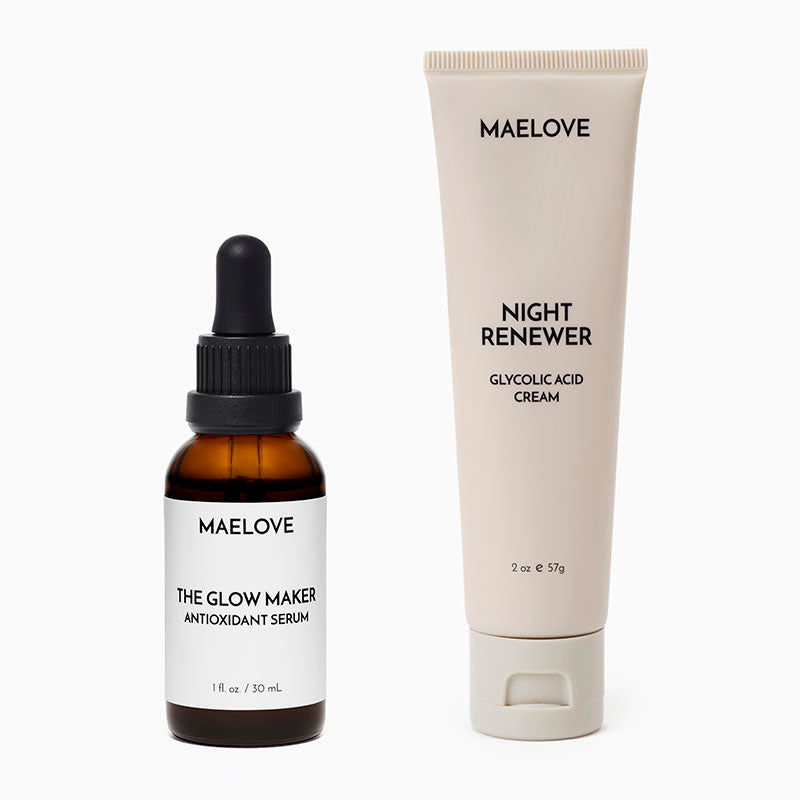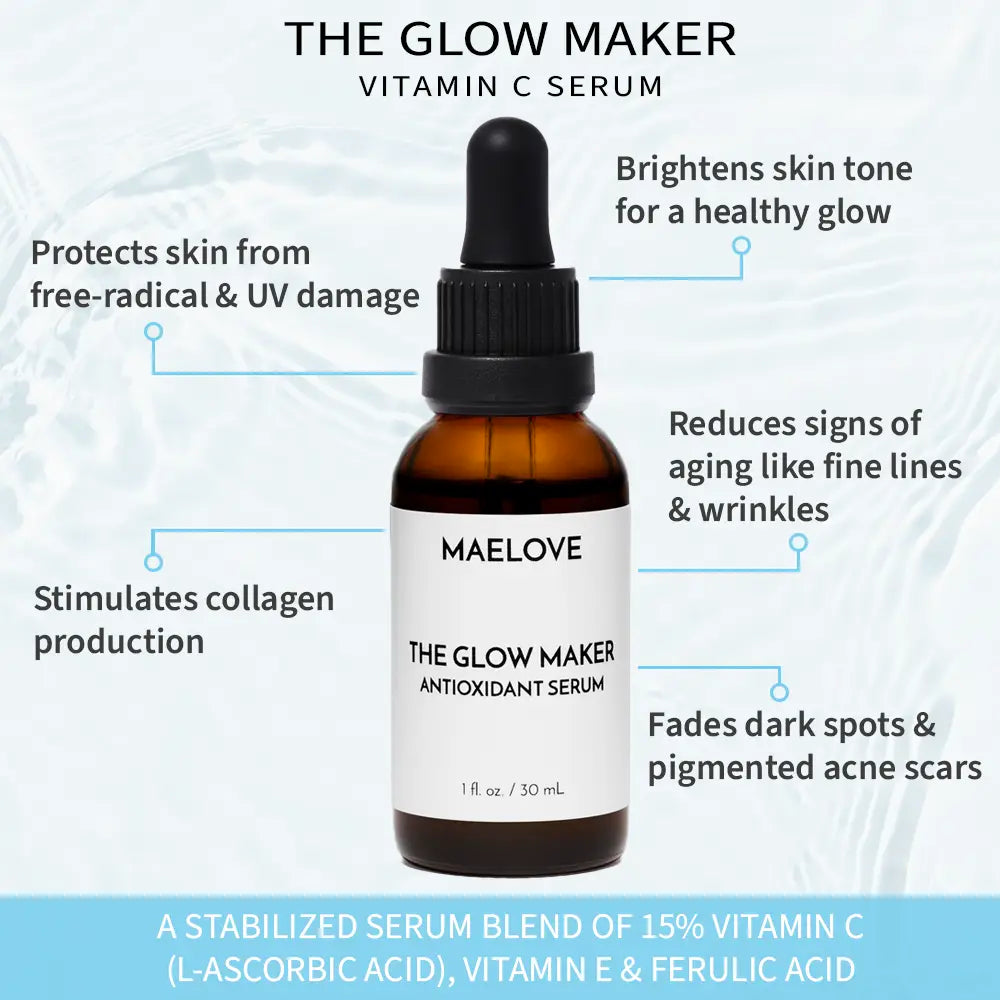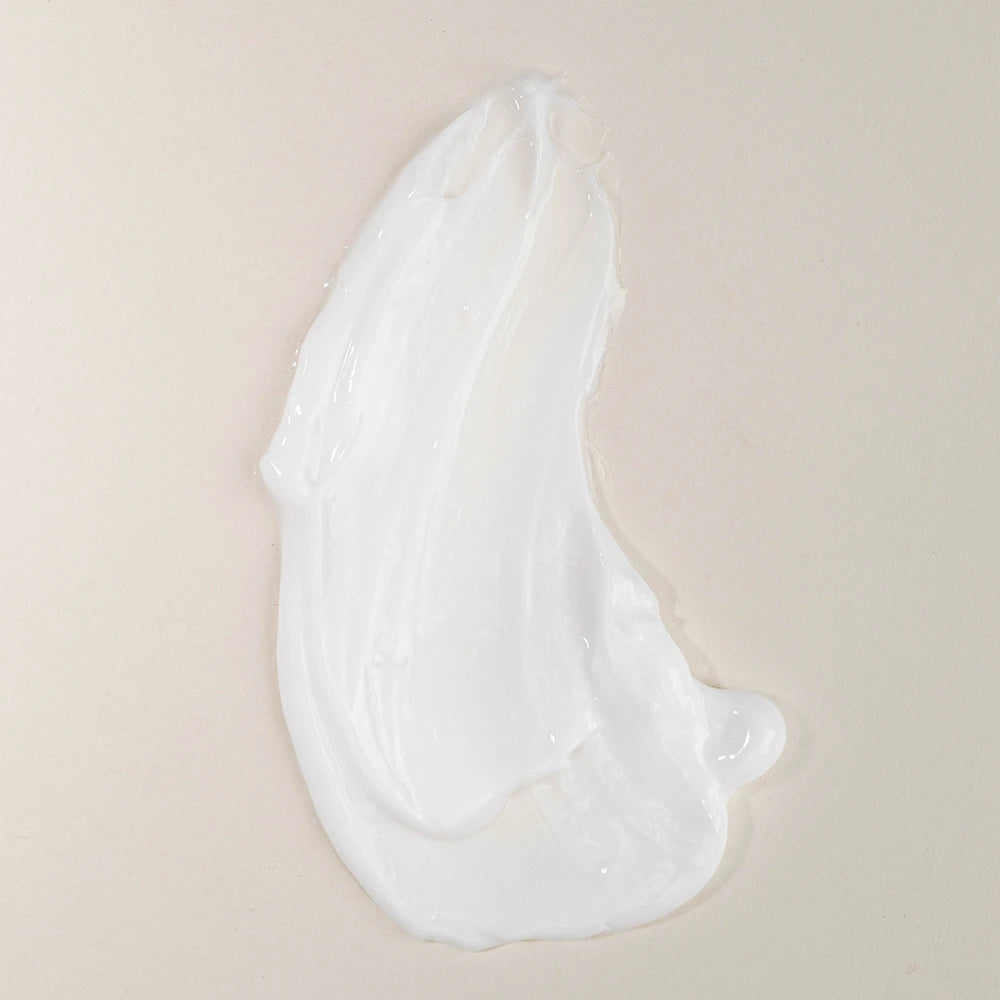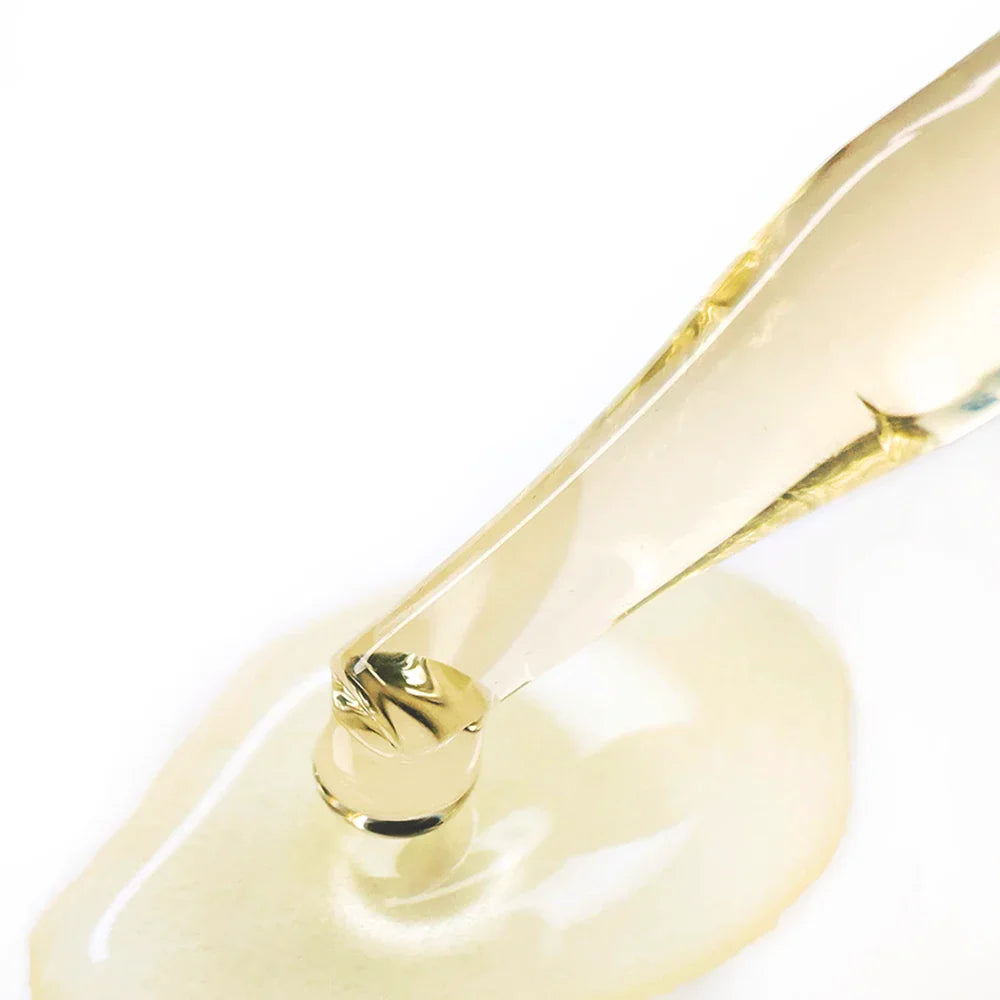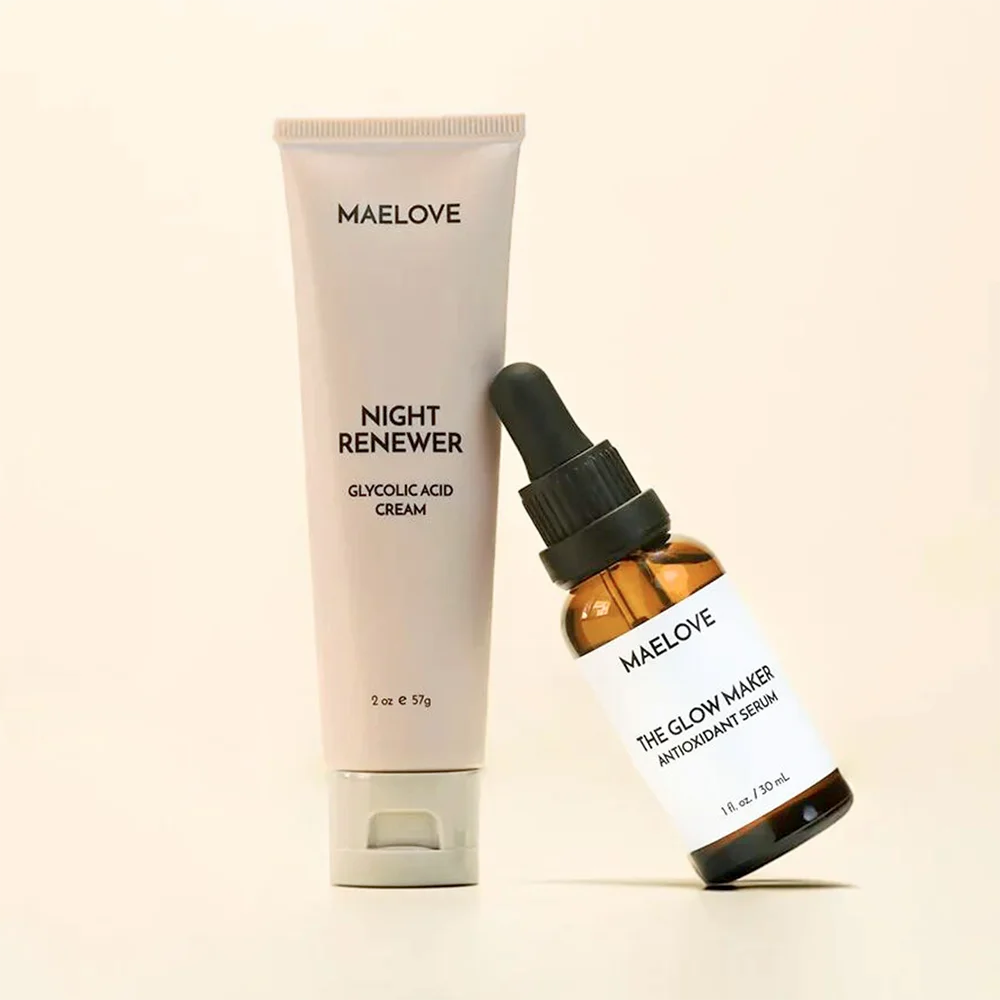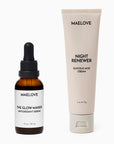
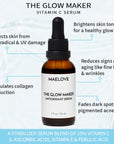
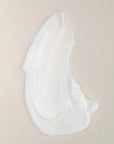
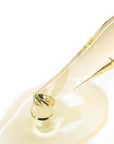
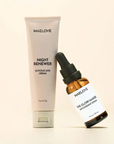
Bestseller Duo
- Improves fine lines and wrinkles
- Brightens skin tone
- Softens skin texture
- 15% vitamin C (L-ascorbic acid)
- Vitamin E
- Ferulic acid
- 10% glycolic acid
Glow Maker Vitamin C Serum
Comprehensive protection against signs of aging and free-radical damage using a proven blend of antioxidants for glowing, even-toned skin. 🏆 Winner — the Strategist Beauty 100 Award
1.0 fl oz / 30 ml
Night Renewer Glycolic Acid Cream
Wake up to smooth, radiant skin after using this 2-in-1 glycolic acid treatment and hydrating night cream. Described as an “overnight facial,” the addition of soothing ingredients help make it sensitive-skin friendly. 🏆 Winner — Best Anti-Aging Cream in Prevention's 2024 Healthy Skin Awards
2.0 fl oz / 60 ml
We firmly stand behind the efficacy of our products, which is why we back them with an industry-leading 100-day Money Back Guarantee.
If you're not 100% happy, return the products within 100 days for a full refund. We even cover the return shipping. It's our commitment to ensuring you're completely satisfied with your Maelove journey.
"In the past I have always used very expensive vitamin C products, none compare to the Glow Maker!!"
- Daryl R.
"Night Renewer is so easy to use. My skin has totally transformed. Friends and family tell me my skin looks flawless and glowing."
- Melissa A.
Introducing
Bestseller Duo
Obsessively Formulated
Glow Maker Serum - An expertly stabilized antioxidant blend of 15% L-ascorbic acid (the most effective form of vitamin C), vitamin E, and ferulic acid defends against UV-damage while boosting collagen and brightening skin. This proven trifecta reduces fine lines, evens out skin tone, and enhances the skin’s radiance.
Night Renewer Cream - A high-performance alpha hydroxy acid (AHA) night cream enhanced with a soothing and hydrating blend of ingredients to ensure effective results without irritation. 10% glycolic acid is a chemical exfoliant that improves skin texture, fades dark spots, and reduces the appearance of lines, wrinkles, and pores while you sleep.
Glow Maker protects against signs of aging using antioxidants
- Shields skin against the #1 cause of premature aging, UV-damage and environmental stressors
- Scientifically-backed vitamin C stimulates collagen production for firm, resilient skin
- Clinically-proven antioxidant blend visibly reduces the formation of fine lines while brightening sun spots
Night Renewer increases skin cell turnover for a healthy, youthful complexion
- Exfoliates as you sleep to remove dead skin cells, promoting smoother, brighter skin
- Stimulates collagen production, reducing the appearance of fine lines and wrinkles over time
- Helps to fade dark spots, acne scars, and hyperpigmentation, resulting in a more even skin tone
Layer your products from thinnest to thickest in texture, waiting a full minute between each product.
In the morning:
After cleansing, apply Glow Maker onto clean, dry skin. (While AM use is preferred, Glow Maker can also be used in the PM if using twice daily). Apply a thin layer to the face, neck, and chest. Massage product in until it is fully absorbed. Lock in the serum with a gentle moisturizer if needed, and then apply sunscreen (broad-spectrum SPF 30 or greater).
In the evening:
Start slow – use Night Renewer 2-3 nights a week on its own. Every few weeks, you may very slowly increase use as your skin adjusts, eventually working up to nightly use and layering with other actives if tolerated. Apply a thin layer to the face, neck, and chest. Massage product in until it is fully absorbed. It may cause a slight tingling sensation initially, which is normal.
Glow Maker
Key Ingredients
Vitamin C (15% L-ascorbic acid), Vitamin E, Ferulic Acid
Supporting Ingredients
Hyaluronic acid, Aloe, Vitis Vinifera (grape extract), Magnolia
Night Renewer
Key Ingredients
10% Glycolic Acid
Supporting Ingredients
Vitamin E, Squalane, Shea Butter, Arnica Flower, Aloe, Hyaluronic Acid, Glycerin
All Maelove products are safe for sensitive skin, made in the US, vegan, cruelty-free, non-comedogenic, gluten-free, and free of parabens, phthalates, dyes, and artificial fragrances. We don't use ingredients that are banned in the EU or in the USA.
Show all ingredients
Product Reviews
For the Curious
Since glycolic acid creams will increase the sun sensitivity of the skin, the Night Renewer should be used only at night, and paired with a broad-spectrum sunscreen with an SPF of at least 30 during the day (Kaidbey et al. 2003).
We recommend using Glow Maker serum and sunscreen in the morning as both contribute to protection against UV damage. A good broad-spectrum SPF is one of the most important things you can do to prevent skin from photoaging. However, even good sunscreens only block about half of the free radicals spawned from UV exposure. Antioxidant vitamin C serums help neutralize free radicals to protect your skin from harmful UV rays. As vitamin C in the skin is quickly depleted by fighting UV damage or other free radical generating activities such as smoke and pollution throughout the day, topical vitamin C application twice a day may be useful to replenish levels when engaged in outdoors activities. Topical vitamin C and sunscreen work by differing mechanisms to protect your skin so the combination is ideal (Lin et al. 2005, Telang et al. 2013).
The most important anti-aging aspect of topical vitamin C (l-ascorbic acid) is its role as one of nature’s best antioxidants and indeed, one of the primary defenses against UV damage employed by the skin. Under normal conditions, special receptors in the skin pull vitamin C out of your bloodstream to pack your skin full of this protective antioxidant which is also the most plentiful antioxidant in the skin (Pullar et al. 2017). The number one cause of premature aging of the skin is UV damage from the sun’s rays. When your skin is exposed to UV rays, free radicals are spawned. These free radicals are like ricocheting bullets tearing up collagen and even DNA leading to photo-aged skin and skin cancers. Fine lines and wrinkles, sunspots, ruptured blood vessels, enlarged pores, and rough coarse skin are some of the features of photo-aged skin.
Unfortunately, like so many processes that occur with general aging, the vitamin C content in your skin wanes as you age irrespective of diet, as poor blood flow and nutrient delivery start to affect levels. In other words, your natural defenses against UV damage go down with aging. This is where topical supplementation can remedy the situation as the skin absorbs the vitamin C applied at the skin’s surface (Pullar et al. 2017).
A second reason vitamin C is such an excellent anti-aging ingredient is that it boosts collagen production. Collagen is the main structural protein in the skin and its decline and degradation are the main drivers of fine lines and wrinkles. The collagen content in skin decreases over time – roughly 1% per year with accelerated loss post-menopause – leading to wrinkles and sagging as we get older. vitamin C is necessary in collagen production. The ability of topical vitamin C to boost collagen production has been demonstrated in placebo-controlled trials of aged skin in postmenopausal women (Nusgens et al. 2001) and in those with photoaged skin (Traikovitch 1999). Note that the role of vitamin C in collagen production is also responsible for its beneficial role in wound healing and for the skin symptoms of scurvy which results from vitamin C deficiency (Pullar et al. 2017).
Complete skin (epidermal) renewal occurs approximately every 28 days in young adults, while the same process takes 40 to 60 days in older people. This accumulated layer of dead skin makes the skin look rougher and the pores look more enlarged. Light reflecting on the skin also reveals a dull surface (Rodan et al. 2016). By chemically exfoliating these dead cells with hydroxy acids, one can immediately reveal smoother, brighter, and younger looking skin. Regular sloughing off of dead skin cells can also encourage faster turnover of the underlying skin cells, which again mimics the renewal process in younger skin (Kornhauser et al. 2010).
A 10% concentration of glycolic acid is the upper allowable limit for cosmetic products as regulated by the FDA. At this concentration, glycolic acid creams can be safely used and with good tolerability (Abels et al. 2011). Further 10% glycolic acid creams can be used daily, and will serve as a powerful chemical exfoliant which will improve skin texture, the appearance of lines and wrinkles. and fade hyperpigmentation over a long time. This is because the increased cell turnover will help slough off hyperpigmented skin and rapidly disperse existing pigment which helps to fade the appearance of hyperpigmentation (Kornhauser et al. 2012). Hence, a glycolic acid cream is a helpful adjunct to use along with serums that treat hyperpigmentation by quickening the process by which hyperpigmented spots are sloughed off.
Chemical peels use a much higher concentration of glycolic acid up to 40%. These should not be done at home and should only be used 1 or 2 times annually. Chemical peels chew through living tissue as well as dead skin cells, and so while they may be able to fade deep pigmentation and remove deep imperfections in the skin. However, they also may lead to scarring and require a longer healing time (Arif 2015, Chilicka et al. 2020, Garg et al. 2009, Sharad 2018).
In addition to exfoliation, 10% glycolic acid can have other benefits as well. Though not typically thought of as a collagen booster, glycolic acid can activate underlying cellular processes that accelerate collagen synthesis by fibroblasts, and modulate matrix degradation through keratinocyte released cytokines (Okano et al. 2003). This collagen building ability was found to increase with increasing concentrations of glycolic acid all while avoiding triggering inflammation when kept at a pH of 4 or higher (Narda et al. 2020). In sun-damaged skin, glycolic acid was found to increase hyaluronic acid content in the epidermis and dermis as well as increasing collagen synthesis and epidermal thickness (Bernstein et al. 2001). In other words, glycolic acid creams are a helpful adjunct to use along with other more powerful anti-aging ingredients such as retinoids to aid in the collagen building process.
Yes. This kit will help tackle hyperpigmentation for a brighter and more even complexion. Vitamin C can not only fight UV damage which is a main cause of hyperpigmentation, but also can inhibit an enzyme (tyrosinase) involved in skin pigment production. A concentration of at least 10% Ascorbic acid is recommended to get maximal benefits against UV induced hyperpigmentation (DeDormeal et al. 2019). Glycolic acid can exfoliate and increase cell turnover which will help slough off hyperpigmented skin and rapidly disperse existing pigment which helps to fade the appearance of hyperpigmentation (Kornhauser et al. 2012).
Ideally when treating hyperpigmentation and dark spots, a combinatory approach is recommended. If hyperpigmentation is your primary concern, we recommend you consider adding a retinoid such as Moonlight and our hyperpigmentation specialist Fade Away to this duo for more intensive treatment of hyperpigmentation.
Products such as the 10% glycolic acid cream Night Renewer will have immediate visible results starting from the very first day after overnight usage. These benefits include a smooth and radiant complexion. Longer term changes to underlying skin take longer to develop and may take weeks to months.
For vitamin C, scientific studies show that the skin will absorb (L-Ascorbic Acid) optimally from a serum when the concentration is between 10-20% Ascorbic Acid. At these concentrations, it reaches saturation after 3 days of consistent daily application (Pinnel et al. 2001). Hence, after 3 days of consistent daily application of Glow Maker, vitamin C levels will reach saturation and begin to provide optimal protection to your skin.
Yes you can. The Glow Maker and The Night Renewer can both be used while pregnant or lactating.
Always double check ingredients with your doctor and follow their protocol.If you want to learn more, please check out the this newsletter.
Kaidbey K, Sutherland B, Bennett P, Wamer WG, Barton C, Dennis D, Kornhauser A (2003). “Topical glycolic acid enhances photodamage by ultraviolet light.” Photodermatology, Photoimmunology & Photomedicine 19(1): 21-27.
Lin FH, Lin JY, Gupta RD, Tournas JA, Burch JA, Selim MA, Monteiro-Riviere NA, Grichik JM, Zielinski J, Pinnell SR (2005). “Ferulic Acid Stabilizes a Solution of Vitamins C and E and Doubles its Photoprotection of Skin.” J Invest Dermatol 125:826-832
Telang PS (2013). “Vitamin C in Dermatology.” Indian Dermatol Online J. 4(2): 143-146.
Nusgens BV, Humbert P, Rougier A, Colige AC, Haftek M, Lambert CA, Richard A, Creidi P, Lapiere CM (2001). “Topically Applied Vitamin C Enhances them RNA Level of Collagens I and III, Their Processing Enzymes and Tissue Inhibitor of Matrix Metalloproteinase 1 in the Human Dermis.” J Investig Dermatol 116(6): 853-859.
Pullar JM, Carr AC, Vissers MCM (2017). “The Roles of Vitamin C in Skin Health.” Nutrients. 9:866. doi:10.3390/nu9080866
Traikovich SS (1999). “Use of Topical Ascorbic Acid and Its Effects on Photodamaged Skin Topography.” Arch Otolaryngol Head Neck Surg 125:1091-1098.
Abels C, Kaszuba A, Michalak I, Werdier D, Knie U, Kaszuba A (2011). “A 10% glycolic acid containing oil-in-water emulsion improves mild acne: a randomized double-blind placebo-controlled trial.” J Cosmet Dermatol 10(3): 202-209.
Arif T (2015). “Salicylic acid as a peeling agent: a comprehensive review.” Clinical, Cosmetic and Investigational Dermatology 8:455-461.
Bernstein EF, Lee J, Brown DB, Yu R, van SE (2001). “Glycolic acid treatment increases type I collagen mRNA and hyaluronic acid content of human skin.” Dermatol Surg 27(5): 429–433.
Chilicka K, Rogowska AM, Szygula R, Taradaj J (2020). “Examining Quality of Life after Treatment with Azelaic and Pyruvic Acid Peels in Women with Acne Vulgaris.” Clinical, Cosmetic and Investigational Dermatology 13:469-477
Garg VK, Sinha S, Sarkar R (2008). “Glycolic Acid Peels Versus Salicylic-Mandelic Acid Peels in Active Acne Vulgaris and Post-Acne Scarring and Hyperpigmentation: A Comparative Study.” Dermatol Surg 35:59-65.
Kornhauser A, Coelho SG, Hearing VJ (2012). “Effects of Cosmetic Formulations Containing Hydroxy acids on Sun-Exposed Skin: Current Applications and Future Developments.” Dermatology Research and Practice. Doi: 10.1155/2012/710893.
Narda M, Trullas C, Brown A, Piquero-Casals J, Granger C, Fabbrocini G.(2021) “Glycolic acid adjusted to pH 4 stimulates collagen production and epidermal renewal without affecting levels of proinflammatory TNF-alpha in human skin explants.” Journal of Cosmetic Dermatology 20:513-521.
Okano Y, Abe Y, Masaki H, Santhanam U, Ichihashi M, Funasaka Y. “Biological effects of glycolic acid on dermal matrix metabolism mediated by dermal fibroblasts and epidermal keratinocytes.” Exp Dermatol. 2003; 12 Suppl 2: 57–63.
Sharad J (2013). “Glycolic acid peel therapy – a current review.” Clinical, Cosmetic and Investigational Dermatology 6:281-288.
Kornhauser A, Coelho SG, Hearing VJ (2012). “Effects of Cosmetic Formulations Containing Hydroxy acids on Sun-Exposed Skin: Current Applications and Future Developments.” Dermatology Research and Practice. Doi: 10.1155/2012/710893.
Pinnell SR, Yang H, Omar M, Monteiro Riviere N, De Buys HV, Walker LC, Yang Y, Levine M (2001). “Topical L-Ascorbic Acid: Percutaneous Absorption Studies.” Dermatol Surg 27:137-142.
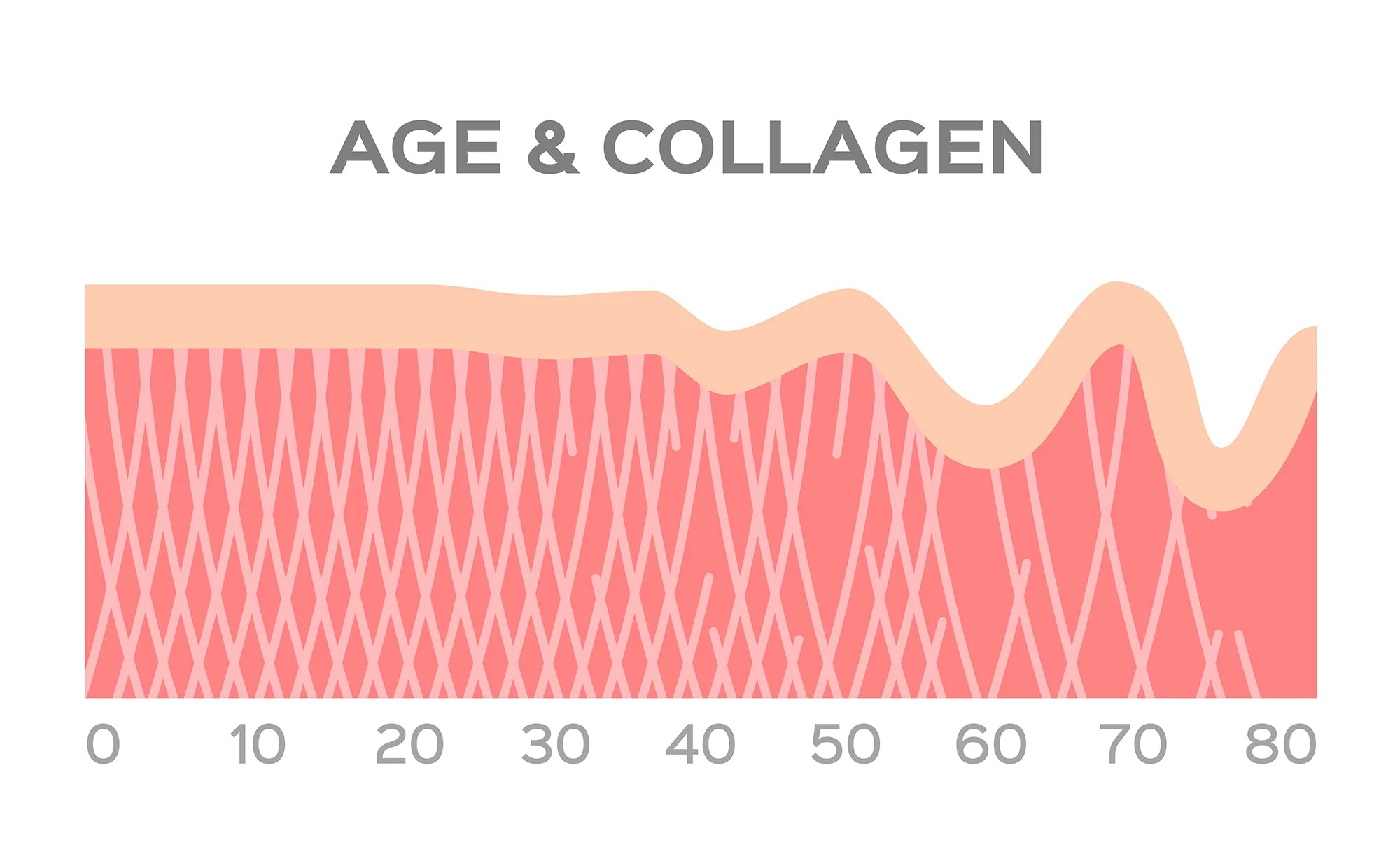
Today we’re talking about collagen, which is easily one of the most talked about topics in skincare. We answer, what is collagen? And maybe more importantly - What are...
